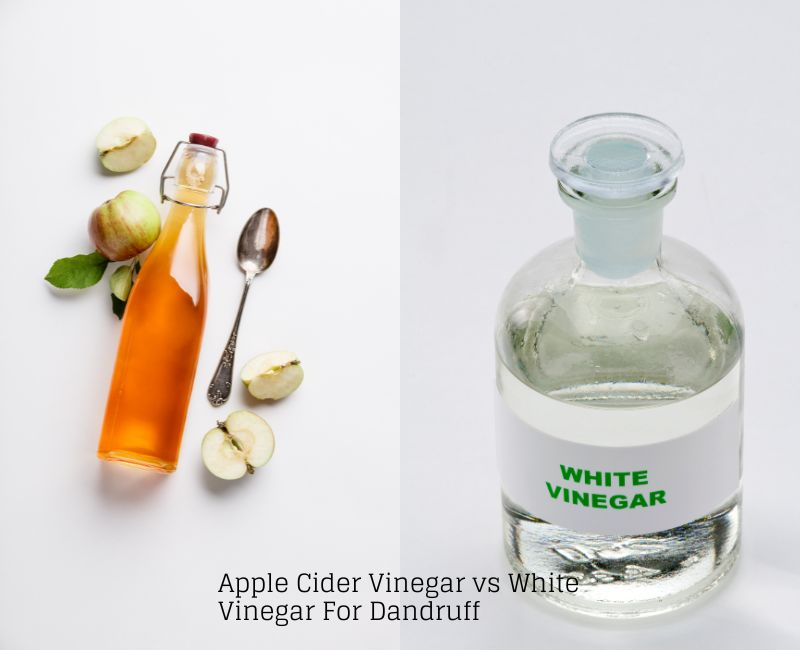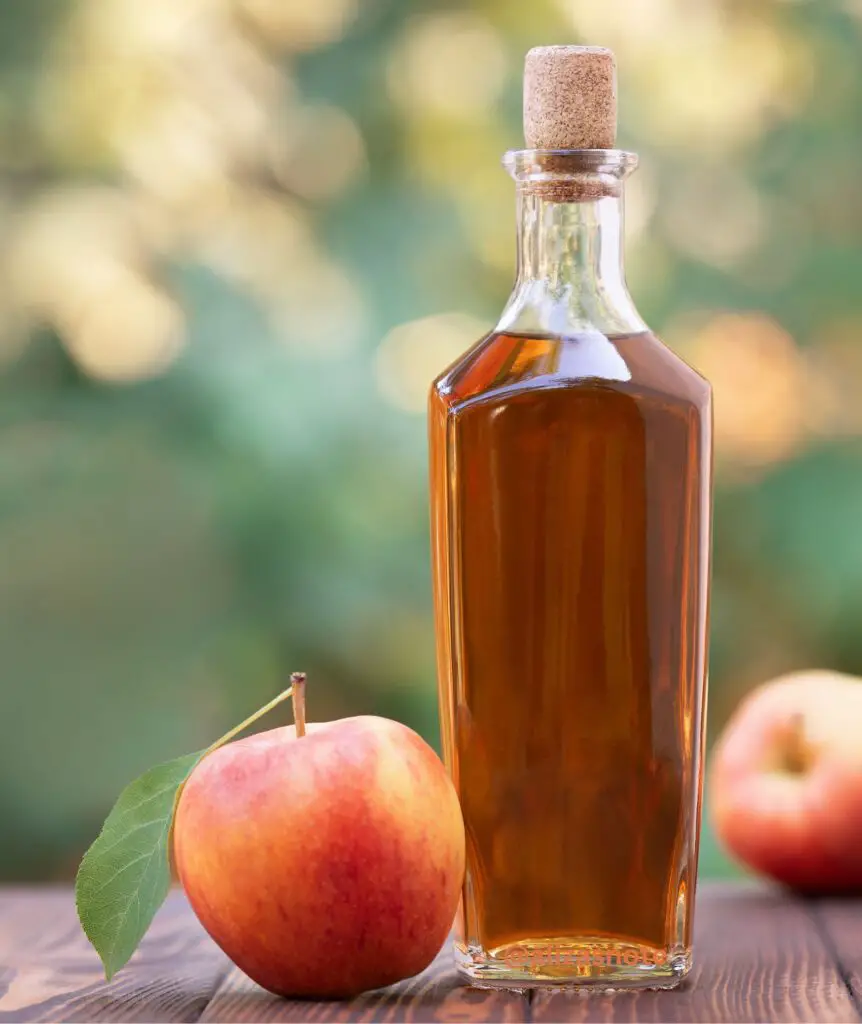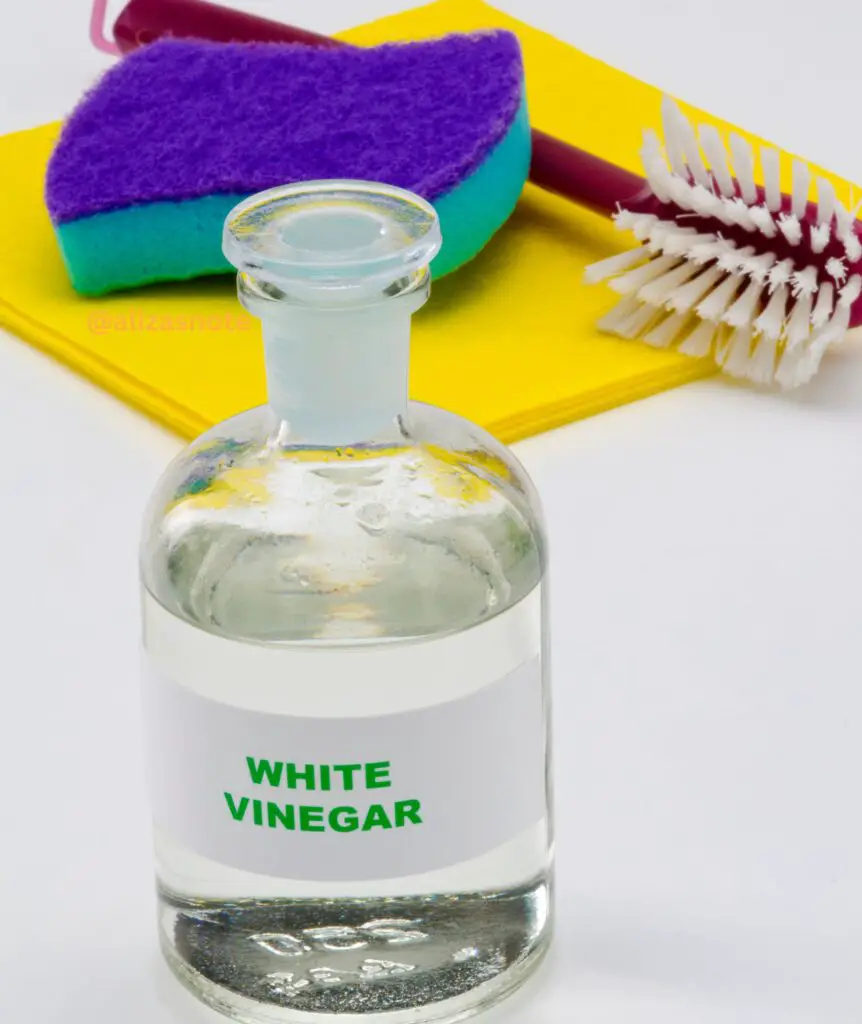No products in the cart.

Apple cider vinegar vs white vinegar for dandruff: both household staples are celebrated for their potential to alleviate scalp issues, but they offer distinct properties and benefits.
Apple cider vinegar, renowned for its diverse health benefits, including antibacterial and antifungal properties, has gained popularity as a natural remedy for dandruff.
Its acidic nature helps rebalance scalp pH levels, potentially hindering the growth of dandruff-causing microorganisms. Moreover, its anti-inflammatory qualities may provide relief from itching and flaking.
Benefits of apple cider vinegar, its astringent properties can efficiently remove excess oil and dead skin cells from the scalp, thereby reducing dandruff symptoms.

Apple cider vinegar (ACV) has gained as a potential natural remedy for dandruff, supported by scientific research validating its effectiveness. Dandruff, characterized by scalp flaking and itching, often stems from the overgrowth of a fungus called Malassezia globosa, accompanied by inflammation. ACV’s antimicrobial and anti-inflammatory properties make it a promising solution for addressing dandruff concerns.
Scientific studies have highlighted ACV’s ability to rebalance the scalp’s pH levels, creating an unfavorable environment for Malassezia growth.Moreover, ACV contains acetic acid, renowned for its potent antimicrobial qualities. Research has demonstrated that acetic acid can inhibit the proliferation of Malassezia and other microorganisms implicated in dandruff formation.
Furthermore, ACV’s anti-inflammatory attributes offer relief from scalp irritation and itching associated with dandruff. Inflammation exacerbates dandruff symptoms, and ACV’s ability to reduce inflammation provides comfort to affected individuals.
However, caution must be exercised when using undiluted vinegar on the scalp due to its high acidity, which may lead to skin irritation and damage. It is advisable to dilute ACV with water before application to reduce its acidity and mitigate potential adverse effects.
Start with a lower concentration of ACV and gradually increase as tolerated to avoid any adverse reactions.

White vinegar, also known as distilled vinegar, offers potential as a remedy for dandruff, supported by its scientific properties. Its efficacy against dandruff is rooted in its acidic composition, predominantly due to acetic acid. This acidity is instrumental in restoring scalp pH balance, creating an environment less favorable for the growth of Malassezia fungus, a common cause of dandruff.
White vinegar’s antimicrobial attributes bolster its effectiveness against dandruff. Acetic acid, the primary component of white vinegar, exhibits broad-spectrum antimicrobial properties capable of inhibiting various microorganisms, including Malassezia. By disrupting fungal cell membranes, white vinegar helps suppress their growth on the scalp, thereby reducing dandruff symptoms.
Additionally, its contribute to its efficacy in dandruff treatment. Astringents work by tightening skin tissues, which can help reduce scalp flakiness associated with dandruff. Furthermore, white vinegar’s astringency may regulate scalp oil production, preventing excessive sebum buildup, a factor that can exacerbate dandruff.
While white vinegar shows promise as a natural remedy for dandruff, caution is necessary during its use. Its high acidity may potentially irritate sensitive skin, hence diluting white vinegar with water before application is advisable. This dilution not only reduces acidity but also lowers the risk of skin irritation.
The properties of white vinegar, including its acidity, antimicrobial activity, and astringency, make it a compelling option for dandruff treatment. and alleviate dandruff symptoms. However, consulting with a dermatologist before use is essential to ensure compatibility with your scalp and skin type.
The comparison between apple cider vinegar (ACV) and white vinegar in addressing dandruff often sparks debate. Both types of vinegar offer distinct properties that can potentially alleviate dandruff issues, making it essential to understand their differences for informed decision-making.
Derived from fermented apple juice, is celebrated for its diverse health benefits and natural properties. Its unique amber color and fruity scent result from the fermentation process, which enriches ACV with acetic acid, alongside vitamins, minerals, and enzymes. These components work synergistically to rebalance scalp pH, inhibit microbial growth, and reduce inflammation associated with dandruff.
Made from fermented grain alcohol, boasts a clear and sharp acidity without the nuanced profile of ACV. Comprising primarily acetic acid diluted in water, white vinegar offers a simpler composition but remains a potent antimicrobial agent. Its straightforward acidity effectively combats dandruff-causing microbes and soothes scalp inflammation.
N:B- The choice between the two depends on personal preferences and scalp needs. Those preferring a comprehensive remedy may opt for ACV, while individuals seeking simplicity may find white vinegar more appealing, both offer potential solutions for achieving a healthy, dandruff-free scalp.
Zaara Says, Having tried both apple cider vinegar (ACV) and white vinegar for dandruff, I found my experiences insightful. While ACV’s holistic benefits intrigued me, I discovered that white vinegar’s simplicity was more effective in soothing my scalp. Although ACV offers a well-rounded approach, white vinegar’s straightforward acidity provided quicker relief from dandruff symptoms.
White vinegar, originating from fermented grain alcohol, offers a clear, sharp acidity, contrasting with apple cider vinegar (ACV) derived from fermented apple juice, known for its nuanced flavor and aroma. While both are beneficial for hair, ACV’s additional nutrients may provide enhanced scalp health benefits.
Both white vinegar and apple cider vinegar (ACV) possess antimicrobial properties suitable for combatting dandruff. However, ACV’s nutrient-rich profile often makes it a preferred choice for individuals seeking comprehensive scalp care solutions.
Absolutely. White vinegar serves as a viable substitute for apple cider vinegar in hair rinses. Both effectively balance scalp pH levels and eliminate product buildup. However, note that white vinegar’s stronger scent and lack of fruity aroma may differ from ACV’s sensory experience.
It’s clear that both options offer distinct advantages rooted in their unique compositions and properties.
Apple cider vinegar, crafted from fermented apple juice, represents a holistic approach to tackling dandruff. Its nuanced flavor and aroma, complemented by additional nutrients, make it an appealing choice for individuals seeking comprehensive scalp care. ACV’s acidity, along with its antimicrobial and anti-inflammatory attributes, offers a multifaceted solution that not only targets dandruff but also nurtures overall scalp health.
Conversely, white vinegar provides a straightforward yet effective remedy for dandruff. Derived from fermented grain alcohol, its clear acidity offers a direct approach to alleviating scalp irritation and microbial imbalance.
Selection between ACV and white vinegar depends on individual preferences, scalp conditions, and specific needs. Experimentation and careful observation of scalp responses are essential in determining the most suitable vinegar type for achieving a dandruff-free scalp.
As always, seeking advice from a dermatologist or healthcare professional can offer valuable guidance in selecting the most effective treatment for optimal scalp wellness.
Related Post:
Jojoba Oil For Dry Scalp
How Aloe Vera Remove Dandruff
Castor Oil Help For Dry Scalp
Coconut Oil And Apple Cider Vinegar For Dandruff care
What To Mix With Aloe Vera For Dandruff Care
How To Remove Dandruff In One Day
What Causes Dandruff
Why do i have dry scalp
When dandruff appears on kids scalp, it can be both perplexing and...
To a dandruff-free scalp, we often explore various remedies, from specialized shampoos...
As parents, our priority is ensuring the well-being of our little ones,...
While countless anti-dandruff products flood the market, it’s often the timeless remedies...